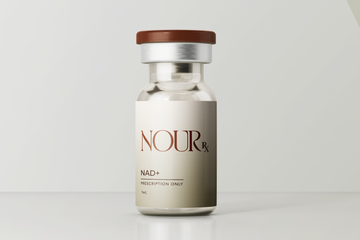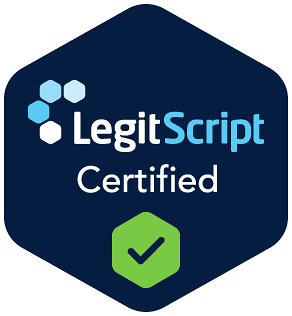As we age, our bodies undergo many changes. From declining energy levels to less resilient skin, the effects of aging are inevitable—but what if there were powerful tools to help slow the process? Enter NAD+ and glutathione, two naturally occurring molecules in the body that play crucial roles in maintaining youthful vitality and overall well-being.
In this blog, we’ll explore the science behind NAD+ and glutathione, and how they can help combat the effects of aging.
What is NAD+? The Fuel for Your Cells
Nicotinamide Adenine Dinucleotide (NAD+) is a coenzyme found in every cell of your body, and it plays an essential role in producing energy at the cellular level. NAD+ is involved in a range of processes that directly impact your overall health:
- Energy Production: NAD+ is critical for converting food into cellular energy, which powers all your body’s functions.
- DNA Repair: NAD+ supports the repair of damaged DNA, which is essential for maintaining healthy cells.
- Cell Regeneration: NAD+ activates sirtuins, enzymes that regulate cellular repair, inflammation, and aging.
As you age, your NAD+ levels naturally decline, leading to reduced energy, slower recovery from physical activity, and a decline in cognitive function. This drop in NAD+ also contributes to the breakdown of cellular processes that protect against age-related conditions.
What is Glutathione? The Master Antioxidant
Glutathione is a potent antioxidant that’s often called the "master antioxidant" due to its powerful ability to fight free radicals and reduce oxidative stress—the main contributor to aging. Glutathione is made up of three amino acids: cysteine, glutamine, and glycine, and is found in every cell of the body.
Key benefits of glutathione include:
- Detoxification: Glutathione helps the liver detoxify harmful substances, promoting overall health.
- Antioxidant Power: It protects cells from oxidative damage, which can accelerate aging and lead to chronic diseases.
- Immune Support: Glutathione boosts immune function and helps the body fight infections and inflammation.
- Skin Health: It helps maintain skin elasticity and brightness by neutralizing free radicals that contribute to wrinkles and dullness.
Similar to NAD+, glutathione levels also decline with age, leading to a compromised ability to fight oxidative stress and repair cells. This decline can manifest in visible signs of aging, such as wrinkles, sagging skin, and reduced energy levels.
The Connection Between NAD+ and Glutathione in Aging
Both NAD+ and glutathione play complementary roles in maintaining youthfulness, but they also share a deeper connection when it comes to aging. Here’s how they work together:
-
Boosting Cellular Repair
NAD+ activates sirtuins, which are enzymes responsible for regulating cell repair and longevity. These sirtuins also help boost glutathione production in the body. Essentially, NAD+ supports the regeneration of cells, while glutathione protects them from damage. -
Fighting Oxidative Stress
Aging is largely driven by oxidative stress, the process by which free radicals damage cells, proteins, and DNA. NAD+ supports DNA repair, while glutathione neutralizes free radicals. Together, they act as a powerful defense system against the cellular damage that accelerates aging. -
Energy and Detoxification
NAD+ is involved in energy production, which is critical for maintaining youthful energy levels. Meanwhile, glutathione supports the body’s detox processes, helping to clear out toxins and waste products. When combined, they enhance your body's ability to stay energized and function optimally, even as you age.
How to Boost NAD+ and Glutathione Levels
The good news is that you can boost both NAD+ and glutathione levels through lifestyle changes, supplements, and diet. Here are some effective strategies:
Boosting NAD+
- Exercise: Regular physical activity is one of the most effective ways to naturally increase NAD+ levels. It helps improve cellular energy production and enhances NAD+ activity.
- Diet: Foods rich in niacin (vitamin B3), like turkey, tuna, and avocados, help support NAD+ production. Certain compounds like NMN (Nicotinamide Mononucleotide) and NR (Nicotinamide Riboside) are also known to boost NAD+ levels.
- Fasting: Intermittent fasting or caloric restriction can stimulate NAD+ production by activating sirtuins and promoting mitochondrial health.
- Supplements: NAD+ precursors like NMN or NR supplements are popular options for boosting NAD+ levels.
Boosting Glutathione
- Diet: Eating foods rich in sulfur-containing amino acids, like garlic, onions, and cruciferous vegetables (broccoli, kale, cabbage), can help your body produce more glutathione.
- Vitamin C and E: These antioxidants help recycle glutathione, keeping it active and effective in combating oxidative stress.
- Supplements: There are several ways to directly supplement glutathione, including liposomal glutathione, which is more easily absorbed by the body.
- Exercise: Moderate exercise also helps increase glutathione levels by reducing oxidative stress and promoting overall antioxidant activity.





